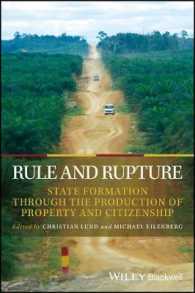- ホーム
- > 洋書
- > 英文書
- > Literary Criticism
Full Description
In At Penpoint Monica Popescu traces the development of African literature during the second half of the twentieth century to address the intertwined effects of the Cold War and decolonization on literary history. Popescu draws on archival materials from the Soviet-sponsored Afro-Asian Writers Association and the CIA-funded Congress for Cultural Freedom alongside considerations of canonical literary works by Ayi Kwei Armah, Ngũgĩ wa Thiong'o, Ousmane SembÈne, Pepetela, Nadine Gordimer, and others. She outlines how the tensions between the United States and the Soviet Union played out in the aesthetic and political debates among African writers and intellectuals. These writers decolonized aesthetic canons even as superpowers attempted to shape African cultural production in ways that would advance their ideological and geopolitical goals. Placing African literature at the crossroads of postcolonial theory and studies of the Cold War, Popescu provides a new reassessment of African literature, aesthetics, and knowledge production.
Contents
Acknowledgments
Introduction. Genres of Cold War Theory: Postcolonial Studies and African Literary Criticism
Part I. African Literary History and the Cold War
1. Pens and Guns: Literary Autonomy, Artistic Commitment, and Secret Sponsorships
2. Aesthetic World-Systems: Mythologies of Modernism and Realism
Part II. Reading through a Cold War Lens
3. Creating Futures, Producing Theory: Strike, Revolution, and the Morning After
4. The Hot Cold War: Rethinking the Global Conflict through Southern Africa
Conclusion. From Postcolonial to World Literature Studies: The Continued Relevance of the Cold War
Notes
Bibliography
Index








